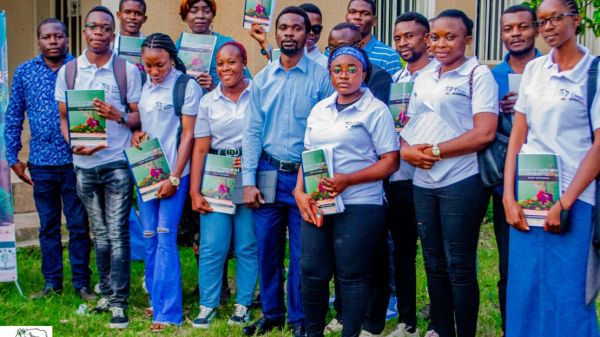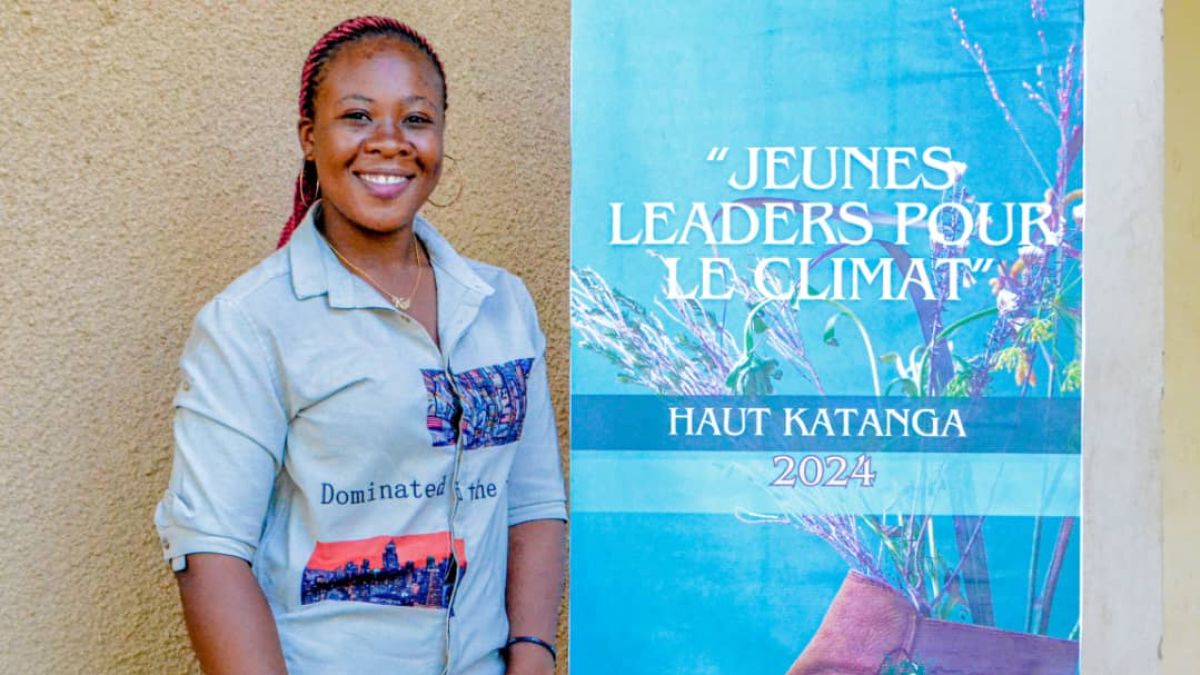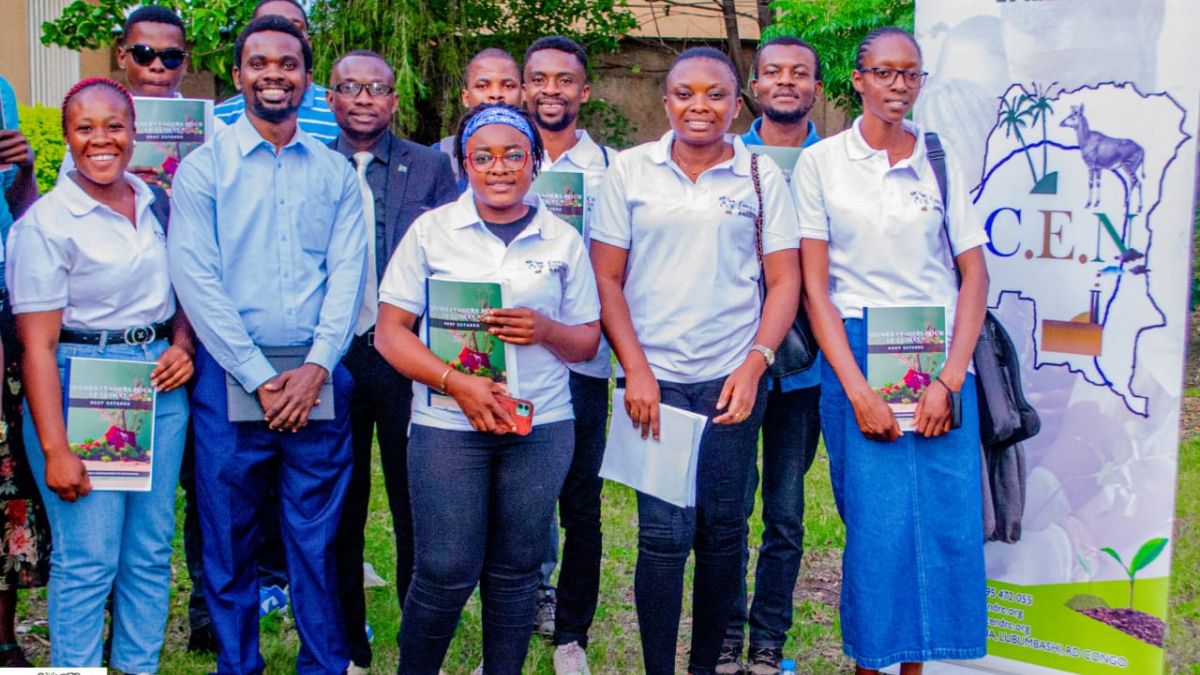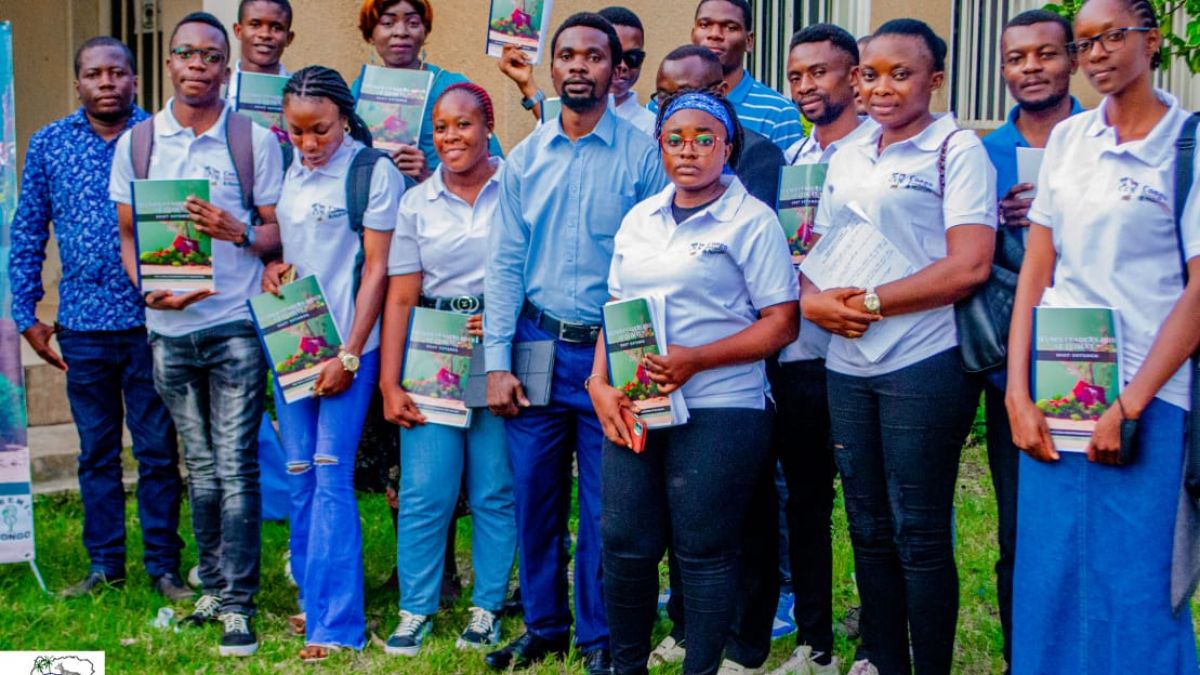CEE-Change Fellowship Inspires Climate Change Action in the D.R. Congo

Each month, NAAEE shares narratives from the CEE-Change Fellows as they implement their community action projects and work to strengthen environmental education and civic engagement capabilities, all supporting the mission of cleaner air, land, and water. Join us on their journey! The Civics and Environmental Education (CEE) Change Fellowship is NAAEE’s newest initiative to support leadership and innovation in civics and environmental education in North America. This ee360+ program is a partnership between NAAEE, U.S. EPA, and the Cedar Tree Foundation.
Have you ever been desperate for a project you wanted to execute but couldn't find any support? Have you ever been stuck between two paths and had to make a big decision? In early 2023, I decided to give up some projects to focus on other things. But a little voice reminded me to think about my goal and the reason I started this journey of contributing to the environmental protection in my country through education and concrete actions. That little voice is called hope.
It is important to me to train young people on climate change, because today's world is plagued by many crises and uncertainties. These crises simultaneously affect all humanity because of the interconnectedness of our societies. This is the case with the climate change crisis which is one of the most important challenges of this century; and no political border will protect us from its threats. It can only be overcome by the goodwill and solidarity of all the inhabitants of the planet.
Sitting and scrolling through my phone one day, I saw NAAEE’s announcement for the CEE-Change Fellowship, which was taking applications for its next cohort. I started the application but disheartened by rejections from similar applications to other organisations, I did not complete it. After receiving an email of extension, I decided to complete the CEE-Change Fellowship application and send it in. To my surprise, I was selected as a fellow. This fellowship revived me, revived my hope, and the mini-grant helped me to implement one of my projects: ‘Developing Young Climate Leaders in the Haut Katanga province/ Democratic Republic of the Congo,’ which is a youth-focused environmental and climate leadership training program focusing on civic engagement, leadership development, project management, entrepreneurship coaching, and environmental literacies that can be adapted in different communities and languages to create a climate education advocacy plan.
Today's younger generations will be the most affected by climate change and its long-term consequences. They, therefore, have a crucial role to play in protecting our planet and building a sustainable future. They must be aware of the great role they play in preserving the environment. They must step up and take the lead to inspire change and build a sustainable future. It was thus important to set up a leadership program focused on climate education.

A photo of one of the participants from the young leaders for the climate training in the Haut Katanga province/ Democratic Republic of the Congo. Photo credit: Congo Environnement et Nature
My community action project began with a call for applications for participation in a training focused on 18 to 35 year-olds from the Haut-Katanga province of the Dominican Republic of the Congo. We received more applicants than we could accept. I noticed the enthusiasm in the applicants, the joy, but also this eagerness to be able to participate in the climate training, which had placed young people at the center.
Working with four trainers, we identified the program's training priorities and decided on five sessions for the participating youth. Our trainers also developed a study materials book and shared it with the participants a week before the first training session, to enable the training sessions to run smoothly.
Here are the key topics and messages we identified for each of the training sessions:
Session 1: Environmental education and climate change:
• Raising awareness, especially among young people is an important step in addressing climate change—we should refrain from taking any action that could contribute to the worsening of the climate crisis.
• Young people can join together to take action towards mitigating the climate crisis.
• Young people can also join forces to put pressure on decision-makers to abandon decisions and initiatives that are harmful to the environment;Session 2: Corporate social responsibility, and development of an advocacy plan:
• Advocacy is defined as persuasive and creative communication to fight against climate change.
• Corporate Social Responsibility (CSR) is the voluntary integration by companies of social and environmental concerns into their commercial activities and their relationships with their stakeholders;
Session 3: Leadership training in environmental protection:
• Young people can raise awareness and mobilize their peers more easily through social networks, art, music, and other platforms to raise public awareness of environmental issues and mobilize their communities around concrete actions;
Session 5: Financial education and green entrepreneurship:
• Identifying the strategies, ideas, and practical advice makes it possible to undertake and invest in initiatives despite the absence of significant funds from the start.
• Providing young people with the necessary tools allows them to realize their green projects and flourish in the world of entrepreneurship and investment, regardless of the quality of the resources they initially have;
Session 6: Project management:
• Teaching young people the fundamentals of how to present their projects. Throughout the project implementation process, young people will need to engage with others who can provide additional resources and expertise. This includes financing, consultation with a specialist, partnering with an individual or organization whose work is complementary to the project, etc. Learning good communication skills is essential, as they must always be ready to talk about their project in a few seconds or a minute. This is how they will find people who can help them occasionally or in the long term.
During the course of the training, the young people's meeting with the Congo Environnement et Nature (CEN) team, as well as with the various trainers, was wonderful. We had before us responsible and capable young people, ready to correct the climate errors of past generations and sustainably preserve the environment through individual and collective actions.
At the end of the course, each participant developed an idea for a solution that can be implemented in their community as a result of all lessons blended together. These ideas were presented via short videos and the CEN team voted for the top three submissions. These were presented to the public at the community event on May 17, 2024 which wrapped up the program.

A group photo of participants from the Developing Young Climate Leaders in the Haut Katanga Province/ Democratic Republic of the Congo training program. Photo credit: Congo Environnement et Nature

A group photo of participants from the Developing Young Climate Leaders in the Haut Katanga Province/ Democratic Republic of the Congo training program. Photo credit: Congo Environnement et Nature
The event brought together more than 80 participants and five speakers with five sub-themes: climate change in general with the coordinator of Premi-Congo Mr. Christian Bwenda, young victims and major actors of the climate change with professor Kalombo Kamutanda expert in climate change, environmental leadership with Ms. Nelly Mutay president of the Academy of Public Speaking and Leadership, the presentation of the book (for responsible ecological behavior in the D.R Congo) by Mr. Jean-Luc Mulyanga of the local cathedral, and finally project management and entrepreneurship with Mr. Valéry Ndala CEO Afrindala SARL. The four-month training program for young Haut-Katangese leaders ended with the presentation of certificates to the participants.
As everything went well and it was inspiring to see the involvement of young people in this training on climate which aims to save our planet, I really want to be funded soon to organize more of such training in other cities, to inform other young people on how to fight climate change through individual and collective actions, while preserving a clean and viable environment for themselves, but also for future generations.
Visit our website or contact us to help CEN expand this project.


